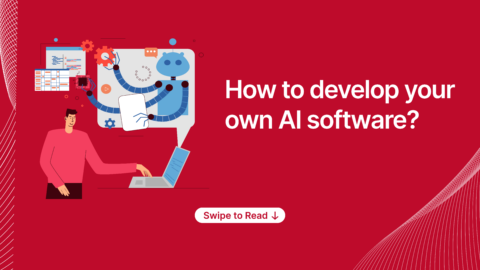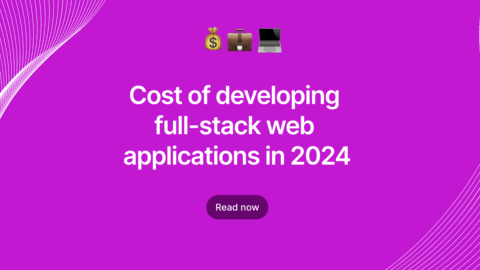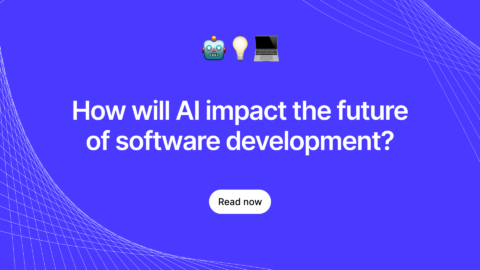
In today’s app-driven world, speed and efficiency are king. That’s why businesses everywhere are turning to AI-powered software development to revolutionize their application development. From machine learning in software development to deep learning, AI is woven into the fabric of the apps we use every day. But how can AI take your app development to the next level? This blog post will dive deep into the benefits of AI, from automating code generation to building ironclad security. We’ll also explore real-world examples and considerations to ensure you’re equipped to leverage this powerful technology for your business.
The Rise of AI & Mobile Application Development
Everyone’s talking about AI these days, and for good reason! By 2030, it’ll be a giant industry, worth tons of money. But here’s the coolest part: phone apps are growing super fast too! Companies are putting more and more cash into making them because everyone uses them all the time.
Now, here’s the gist of it: AI-powered software development can help companies build these apps much faster and even better! Imagine apps that are super easy to use and do exactly what you need them to do – that’s the power of AI! Companies that jump on this trend early will have a big advantage over the competition.
So, how exactly does this super smart tech help build awesome apps? Let’s find out together in this blog.
Making Apps Smarter: Top Trends in AI
Imagine apps that know what you like before you do! That’s the power of AI in mobile apps. Here’s a look at some of the coolest ways AI is making apps smarter and more helpful:
AI-powered Recommendation Systems
One of the biggest trends in using AI for mobile apps is recommendation systems. AI looks at user data, behavior, and preferences to give personalized suggestions and recommendations.
Machine Learning Algorithms for App Personalization
AI uses machine learning in software development to make mobile apps more personalized. These algorithms look at how users interact with the app, their preferences, and demographics to deliver targeted content, features, and recommendations.
AI-driven Virtual Assistants
AI-powered software development includes creating virtual assistants that are becoming more popular in mobile apps. These smart helpers can understand and respond to user questions, provide recommendations, and perform tasks for the user.
Advancements in Natural Language Processing (NLP) and Voice Recognition

Improvements in NLP for Voice Commands and Text Analysis
Recent improvements in natural language processing (NLP) have made voice commands and text analysis in mobile apps much better. NLP algorithms can understand and interpret what users say, allowing for voice-based interactions and commands.
The Role of Voice Recognition in App Interaction
Voice recognition technology is very important for interacting with apps. Advanced voice recognition lets users dictate messages, search for information, and perform complex tasks using only voice commands.
NLP and Voice Integration for Multilingual Support
AI-driven NLP and voice technology also support multiple languages in mobile apps. Language barriers are reduced because NLP algorithms can analyze and translate many languages, allowing users to interact with apps in their preferred language.
Enhanced User Experience through AI-driven Personalization
The Benefits of Personalized App Experiences
Personalized app experiences are a big improvement in mobile app development. AI helps developers deliver content, features, and recommendations tailored to each user’s preferences and behavior.
AI-powered User Behavior Analysis for Personalization
AI analyzes user behavior to create personalized app experiences. By watching how users interact with the app, their preferences, and usage patterns, AI can spot trends and make relevant recommendations.
The Role of AI in Contextual App Experiences
AI also allows for contextual app experiences, where the app adapts to the user’s environment and situation. Using data from sensors, location services, and user behavior, AI can provide timely and relevant information or features. For example, a weather app can automatically show the forecast for the user’s current location, creating a seamless and contextual user experience.

Predictive Analytics and AI-powered App Performance Optimization
Nobody likes a slow and unresponsive app. Thankfully, AI-powered software development helps app developers predict user behavior and optimize app performance better than ever before.
By analyzing user data and patterns, AI algorithms can anticipate user actions and deliver personalized experiences. This means your favorite mobile apps can predict your needs and provide tailored content, making your app usage smoother and more enjoyable.
AI-driven insights also help developers optimize app performance. By identifying bottlenecks and analyzing usage patterns, AI algorithms offer valuable suggestions for improving app speed and efficiency.
Future Predictions: AI’s Impact on Mobile App Development in 2024
What does the future hold for AI in mobile app development? The possibilities are endless.
AI is set to revolutionize the mobile app industry in many ways. From automating repetitive tasks to enhancing user experiences, AI can transform how we interact with mobile apps. Developers will have powerful tools and frameworks that speed up the app development process, making it more efficient and cost-effective.
However, with great power comes great responsibility. Ethical considerations and challenges surrounding AI in app development must be addressed. Ensuring transparency, data privacy, and fairness in algorithmic decision-making will be crucial for building trust with users.
Conclusion
As AI continues to evolve, its role in software development will only become more critical. Embracing AI-powered software development not only enhances the efficiency of the development process but also significantly improves user experience. By leveraging machine learning in software development and AI for code generation, businesses can stay ahead of the competition and meet the ever-growing demands of users.










